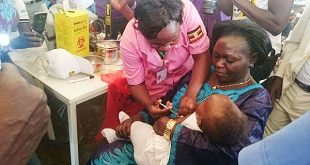Unanswered questions
There is a strong need for greater understanding of Ebola virus infections, including:
- When Ebola virus is transmitted to reproductive tissues during illness.
- How Ebola virus persists over extended periods in reproductive tissues.
- How long persistent virus remains infectious.
- How often sexual transmission occurs.
In a bid to answer some of these questions – particularly the molecular intricacies of Ebola virus persistence within the reproductive system – we used laboratory models of male and female reproductive systems. This allowed us to:
- Study the dynamics of Ebola virus transmission to the reproductive system.
- Identify the particular types of cells that are infected by Ebola virus in the reproductive system.
- Determine how local immune responses in the infected cells help facilitate Ebola virus persistence.
- Characterise damage to the reproductive system, including altered sperm health.
We have also performed Ebola virus infections in mice to better understand how our molecular data reflects the complex pathophysiology of Ebola virus disease and persistence in humans. Mouse models have been used in numerous investigations of Ebola virus infection.
By infecting mice with Ebola virus, we can determine whether the male reproductive system is damaged by persistent infection. We can also determine if there is an effect on fertility, and how often persistent infections result in sexual transmission. In addition, infections of female mice help us determine the severity of disease caused by sexually transmitted Ebola virus, the effects on female fertility, and consequences for gestational development.
In addition to our laboratory research, we are surveying Ebola disease survivors in Sierra Leone in an effort to identify and understand the long-term health consequences, with a focus on reproductive health. Our goal is to determine if survivors have encountered post-recovery reproductive complications such as reduced fertility or problems during pregnancy.
We are also investigating whether Ebola disease survivors face greater burdens of subsequent infections by other pathogens.
Future outbreaks
The recent success of vaccination and therapeutic treatments in the current DRC Ebola disease outbreak provides hope. But a great deal about the virus remains unknown. A greater understanding of the mechanisms of how persistent infections occur will help us guide future outbreak response efforts, with the goal of reducing additional Ebola virus transmission events and providing increased care, support and safety for survivors and their communities.
****
Andrew L. Webb is PhD Candidate, University of Manitoba, Brayden G. Schindell is PhD Candidate, University of Manitoba, Jason Kindrachuk is Assistant Professor/Canada Research Chair in emerging viruses, University of Manitoba, and Jia B. Kangbai is PhD candidate, Ludwig Maximilian University of Munich
Source; theconversation
 The Independent Uganda: You get the Truth we Pay the Price
The Independent Uganda: You get the Truth we Pay the Price


